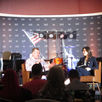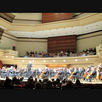Revenge, blood and tragedy in Lyric Opera’s Elektra
- Feb 13, 2019
- 6 min read
Three more performances left of Lyric Opera’s thrilling production of Elektra, Strauss’s powerful masterpiece.

Lyric Opera of Chicago is excited to introduce to you the unforgettable talent of Richard Strauss, a virtuoso German composer of the late Romantic and early modern eras. His endless imagination and technically complex musicality test the skills of the orchestra and the soloists. Strauss’s opera Elektra might scare you with its emotional darkness, “blood-and-iron” sound, endless dissonance, and overwhelming psychological tension. Even if this sounds a little bit frightening, Strauss’s talent is phenomenal in its never ending passion and intensity. His Elektra will grasp you for 100 horrific minutes that you will never forget. Three more performances of Elektra will take place at 7 p.m. on February 14, 7 p.m. on February 18, and 7 p.m. on February 22 at the Lyric Opera House located at 20 N. Wacker Drive in Chicago.
Elektra is a one-act opera sung in German with projected English translations. Libretto was written by Hugo von Hofmannsthal, which he adapted from his 1903 drama Elektra. It is based on ancient Greek mythology and is the second of Strauss's two modernist operas (the other one is Salome). The opera captures your soul and makes it wander in the kingdom of precious and complicated melodies, extreme intervals, long musical phrases, cacophonous sections, atonal leitmotifs, and endless dissonance. This operatic tour de force will not leave you indifferent.
“Certain works are impossible to present onstage unless the right protagonist is on hand,” wrote Lyric’s General Director, President and CEO Anthony Freud in Lyric Notes. “One of those operas is Richard Strauss’s Elektra, which presents dramatic sopranos with their most awe-inspiring challenge. The title role is a veritable Matterhorn, replete with stupendous heights and depths of emotion requiring the ultimate in vocal, musical, and dramatic excellence.”

The main heroine, Elektra, is the Mycenaean princess whose father, Agamemnon, was murdered by her mother, Klytämnestra, and her mother’s lover, Aegisth. Elektra is obsessed with the thought of revenge, which becomes the main idea of the whole opera. She tries to convince her sister, Chrysothemis, to join her in murdering their mother, but Chrysothemis doesn’t want to be part of it. Orest, Elektra’s banished long lost-brother, finally returns and kills both Klytämnestra and Aegisth. The murder of Agamemnon is avenged, and Elektra dances with triumph. Then she falls senseless to the ground. Extremely difficult solos, “advanced” musical passages and powerful orchestration lead to the opera’s “hair-raising” finale that is theatrically magnificent and emotionally devastating. Blood, murders, agony – this all is expressed in the form of a stunning vocal marathon.
Elektra is considered to be one of the most frequently performed operas based on classical Greek mythology. Elektra premiered at the Sächsische Staatsoper, Dresden, on January 25, 1909. It was first performed by Lyric Opera of Chicago on October 10, 1975. Now, 110 years after its premiere in Dresden, Elektra is still fresh and vivid just as the composer intended it to be. Certainly, this 100-minute musical thrill ride of madness and murder requires extremely skilled, extraordinary singers, and Lyric Opera is proud of its outstanding and superb cast.

The main role of Elektra is performed by acclaimed Swedish soprano Nina Stemme. This is her long-awaited debut at Lyric Opera of Chicago. Winner of the 2018 Birgit Nilsson Prize, Stemme has previously portrayed Elektra at the Metropolitan Opera, the major houses of Vienna, Berlin, Munich and also in Paris. This complicated role demands a great singing actress with a strong and flexible voice and extremely bright artistic skills, and Stemme is the actress who possesses all the necessary qualifications. Her vocal power, unimaginable singing technique, and ability to demonstrate the emotional tension and misery of the main heroine capture the audience during the entire opera and evoke a storm of intense and unforgettable feelings. This is one of the most challenging soprano roles in the operatic repertoire, and Stemme is excellent in it.

While the main heroine is going through the emotional disaster, she meets with other characters, mostly one at a time. Her sister, warm and womanly Chrysothemis, is portrayed by the much-acclaimed South African soprano Elza Van Den Heever, who was previously seen at Lyric in the role of Armida in Rinaldo. Heever scored a triumph as Chrysothemis last season at the Metropolitan Opera where she has also earned praise for several other challenging roles. This extremely talented singer finds the best way to demonstrate Elektra’s sister who wants to leave her mother’s house, marry and raise children. To portray Chrysothemis’s personality, Heever uses not only her great vocal power, but also sincerity and warmth in her voice and overall presentation.

One of the most graphic and controversial characters is Elektra’s mother, Klytämnestra, who along with her lover, Aegisth, killed the father of her children, Agamemnon. The opera doesn’t say why she did it, although in some ways she had a reason as Agamemnon sacrificed one of their daughters, Iphigenia, before he went to war against Troy. His action made Klytämnestra hate him and eventually murder him. Now, she is scared that her children will avenge her for doing that, and it reflects in the emotional torture which she is going through. The role of Klytämnestra is fantastically performed by acclaimed American mezzo-soprano Michaela Martens who is renowned internationally for portraying some of the most memorably dramatic roles in the operatic repertoire. Martens is great in presenting German roles as she possesses a low rich voice, unbeatable charisma and unique artistry. Her Klytämnestra has already scored triumph in San Francisco and Houston, and Chicago audiences have also fell in love with her outgoing presentation and riveting voice.
The role of Elektra’s banished brother Orest is presented by Scottish bass-baritone Iain Paterson, one of today’s leading interpreters of heroic bass-baritone repertoire. It is Paterson’s Lyric debut, and he has already impressed the Chicago audiences with his first-class presentation of this role and his full and lavish voice. Paterson’s talent is greatly appreciated all over the world and has been shining at numerous prestigious venues such as Berlin State Opera, Dutch National Opera, Bavarian State Opera, Deutsche Oper Berlin, Royal Opera House Covent Garden, and many others.

The role of Klytaemnestra's lover, Aegisth, is fantastically presented by charismatic American tenor Robert Brubaker. This is the Lyric debut for this internationally established singing actor who feels comfortable performing roles from immensely varied repertoire that requires vivid artistic presentation and flexible vocal skills. His Aegisth disgusts the audience with his creepy personality and at the same time captivates with the singer’s outgoing acting skills.
This ancient family drama also brings to stage such acclaimed American singers as soprano Susan Foster, contralto Lauren Decker, mezzo-soprano Mary Phillips, mezzo-soprano Krysty Swann, soprano Alexandra LoBianco, soprano Ann Toomey, bass-baritone Philip Horst, soprano Whitney Morrison, soprano Emily Pogorelc, tenor Eric Ferring, and bass-baritone Kenneth Nichols.

The Elektra production became the Lyric debut for internationally renowned award-winning Scottish conductor Donald Runnicles. Being general music director of the Deutsche Oper Berlin, music director of the Grand Teton Music Festival, and principal guest conductor of the Atlanta Symphony Orchestra, Runnicles is known for his outstanding conducting skills and especially celebrated for his unforgettable interpretations of the romantic and late-Romantic repertoire. Maestro puts every piece that he conducts through his heart, which makes his orchestras sound with brilliance, power and warmth. Being a master of creating close relationships with musicians, Runnicles knows how to deliver the main idea that stand behind each musical score. “For me, great opera always has something spiritual,” said Maestro Runnicles. Chicago audiences have a great chance to experience the special spirit of Richard Strauss and his Elektra delivered to them under the baton of Runnicles.
This unforgettable opera impresses not only with its powerfully evocative music, extremely fluid tonality, twisted plot, riveting acting and singing and complex female characters, but also with strong directorship and unforgettable visuals. “Sir David McVicar’s Elektra production delivers a punch to the solar plexus like no other Elektra I’ve seen,” noted Anthony Freud. “The world that set and costume designer John Macfarlane and lighting designer Jennifer Tipton have created with David is extraordinarily oppressive, threatening, and terrifying, in which the tragedy of the central characters comes devastatingly to life.”

“Nobody gains from this pain,” says at some point Elektra’s sister, Chrysothemis, and she is right. The only party that actually gains from it is the audience, which during these magnificently theatrical and devastatingly moving 100 minutes of Strauss’s Elektra witnesses the misery of these ancient family relationships that end tragically. Thank God, only on the stage.
For more information and to order tickets, visit https://www.lyricopera.org/elektra or call 312-827-5600. Tickets start at $37.
Natalia Dagenhart
Photos: Courtesy of Cory Weaver

























Comments